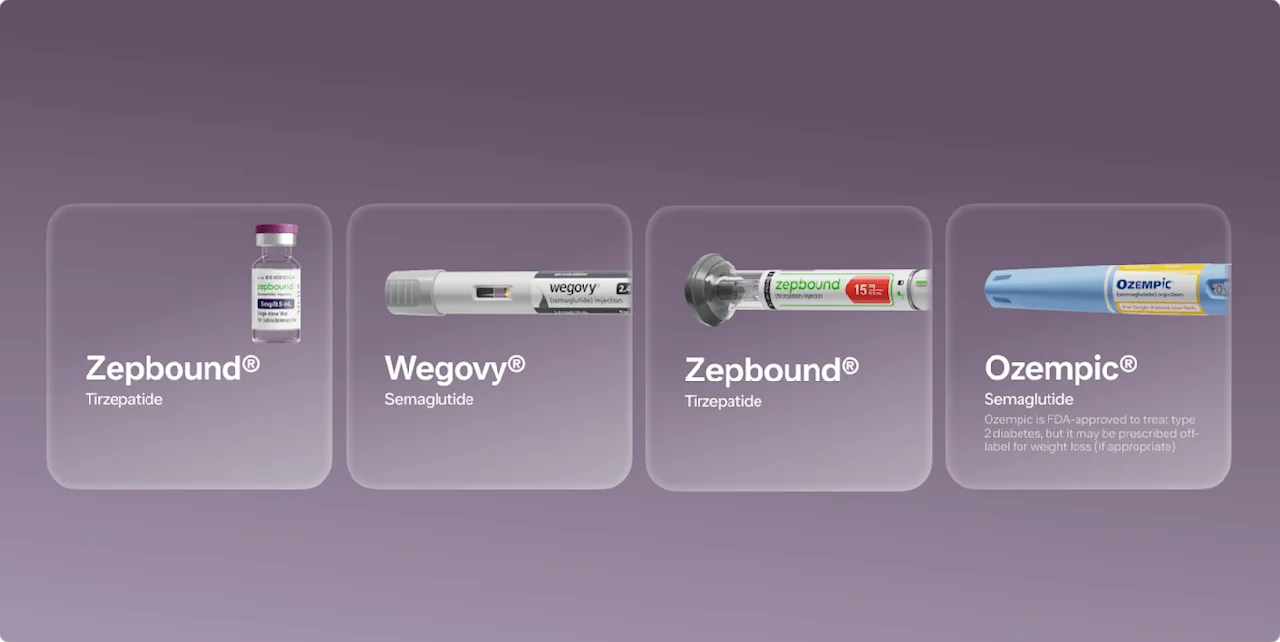Here's what we'll cover
Here's what we'll cover
Have you ever felt those first-date jitters or nerves over an upcoming job interview? From time to time, we all experience a certain degree of anxiety, especially when dealing with issues related to our health, money, and relationships. Anxiety in small doses can actually be beneficial to our health—these feelings can help us notice when we’re in danger, helping ensure our safety (Steimer, 2002).
But if your feelings of anxiety are extreme and long-lasting, you may be suffering from an anxiety disorder. There are many types of anxiety disorders, some of which are treatable with medication, psychotherapy, or a combination of both. While these medications can effectively treat your anxiety, they may also cause certain side effects, including weight gain or weight loss.
Does anxiety medication cause weight gain?
Weight gain is a more common symptom of anti-anxiety medications than weight loss. A 2019 review of 27 studies found that, on average, participants experienced a weight gain of 5% while taking antidepressants (which are commonly used to treat anxiety, too) (Alonso-Pedrero, 2019).
There are a few possible reasons you may gain weight when on anti-anxiety medications. First, if you are depressed or have an anxiety disorder, this can affect your appetite, causing you to gain weight. Secondly, some types of antidepressants can increase appetite and affect your metabolism, causing your body to burn calories more slowly, which may result in weight gain.
However, some anti-anxiety meds can also cause weight loss by decreasing a person’s appetite. As mentioned earlier, your depression, anxiety, or overall mental health may affect your eating habits and activity levels. Treating the underlying condition may lessen or stop these behaviors that lead to weight gain.
Can anxiety medications cause weight loss?
Weight loss while taking anti-anxiety medications is less common than weight gain, but it can happen. However, all weight changes while taking medication are individual, so it’s hard to predict what will happen before you start taking a particular drug.
Many providers turn to certain types of antidepressants, like SSRIs or selective serotonin reuptake inhibitors, to treat anxiety—they can help ease symptoms of anxiety and depression while causing fewer side effects than other types of antidepressants. Some SSRIs have been shown to cause weight loss in the short term but can lead to an increase in weight after six months (Lee, 2016). This initial weight loss may come from feeling better due to the drug, which can make people more active.
Antidepressants can also cause nausea or loss of appetite, which can result in weight loss.
There are, in fact, certain antidepressants that are more likely to cause weight loss. Let’s take a look at them below.
Best anxiety meds that cause weight loss
While there is no one best anxiety medication for weight loss, there are a few antidepressants that are not associated with weight gain. These include:
Bupropion (Wellbutrin)
Fluoxetine (Prozac)
Duloxetine (Cymbalta)
Bupropion
Bupropion is an antidepressant and smoking cessation aid. Studies suggest that non-smokers who take bupropion may lose around 7 pounds (Aggarwal, 2016). Of the antidepressants listed above, bupropion has the most studies connecting it to weight loss.
Fluoxetine
Fluoxetine is an SSRI used to treat depression, obsessive-compulsive disorder (OCD), bulimia nervosa, and panic disorder. Recent research suggests that adults with overweight or obesity may lose an average of up to 2.7 kilograms (about 6 pounds) during the first six months of treatment. However, fluoxetine does come with side effects other than weight gain (Serralde-Zuñiga, 2022).
Duloxetine
Duloxetine is an antidepressant and nerve medication. While taking duloxetine may lead to about a pound of weight loss after 8 or 9 weeks of treatment, taking it for longer may lead to eventual weight gain, especially at higher doses (Wise, 2006).
Antidepressants and anti-anxiety medications are very effective at treating depression and anxiety—but they can have side effects. While more research is needed to fully understand why and how these medications affect weight, we know that depression and anxiety can also affect your appetite and behaviors and, therefore, your weight.
While most medications of this type are associated with weight gain, certain anti-anxiety medications may be linked to weight loss. Because everyone is different, there is no one-size-fits-all approach to these types of medications. Talk with your healthcare provider about your medication regime, and know that regular exercise, healthy eating habits, and good self-care remain essential parts of managing weight.
DISCLAIMER
If you have any medical questions or concerns, please talk to your healthcare provider. The articles on Health Guide are underpinned by peer-reviewed research and information drawn from medical societies and governmental agencies. However, they are not a substitute for professional medical advice, diagnosis, or treatment.
Aggarwal, A., Jethani, S. L., Rohatgi, R. K., et al. (2016). Selective serotonin re-uptake inhibitors (SSRIs) induced weight changes: A dose and duration dependent study on albino rats. Journal of Clinical and Diagnostic Research, 10 (3), AF01–AF3. doi:10.7860/JCDR/2016/16482.7376. Retrieved from https://www.ncbi.nlm.nih.gov/pmc/articles/PMC4850471/
Alonso-Pedrero, L., Bes-Rastrollo, M., & Marti, A. (2019). Effects of antidepressant and antipsychotic use on weight gain: A systematic review. Obesity Reviews, 20 (12), 1680–1690. doi:10.1111/obr.12934. Retrieved from https://onlinelibrary.wiley.com/doi/full/10.1111/obr.12934
Lee, S. H., Paz-Filho, G., Mastronardi, C., et al. (2016). Is increased antidepressant exposure a contributory factor to the obesity pandemic?. Translational Psychiatry, 6 (3), e759. doi:10.1038/tp.2016.25. Retrieved from https://pubmed.ncbi.nlm.nih.gov/26978741/
Serralde-Zuñiga, A. E., González-Garay, A. G., Rodríguez-Carmona, Y. et al. (2022). Use of fluoxetine to reduce weight in adults with overweight or obesity: Abridged republication of the Cochrane Systematic Review. Obesity Facts, 15 (4), 473–486. doi:10.1159/000524995. Retrieved from https://www.karger.com/Article/FullText/524995
Steimer, T. (2002). The biology of fear- and anxiety-related behaviors. Dialogues in Clinical Neuroscience, 4 (3), 231–249. doi:10.31887/DCNS.2002.4.3/tsteimer. Retrieved from https://www.tandfonline.com/doi/full/10.31887/DCNS.2002.4.3/tsteimer
Wise, T. N., Perahia, D. G., Pangallo, B. A., et al. (2006). Effects of the antidepressant duloxetine on body weight: analyses of 10 clinical studies. Primary Care Companion to the Journal of Clinical Psychiatry, 8 (5), 269–278. doi:10.4088/pcc.v08n0503. Retrieved from https://www.ncbi.nlm.nih.gov/pmc/articles/PMC1764530/










